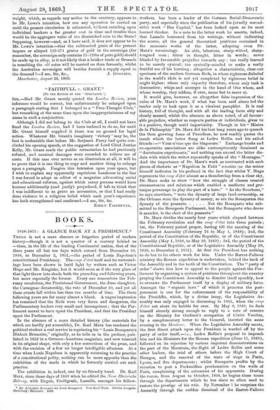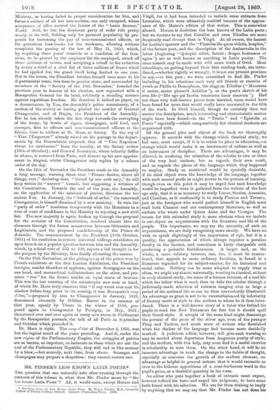BOOKS.
1848-1851: A GLANCE BACK AT A PRESIDENCY.* THERE is not a more obscure or forgotten period of modern history—though it is not a quarter of a century behind us —than, in the life of the leading Continental nation, that of the three years all but ten days which extend from December 10, 1848, to December 2, 1851,—the period of Louis Napoleon's constitutional Presidency. The coup d'etat itself and its surround- ings have been shown in lurid light by writers such as Victor Hugo and Mr. Kinglake, but it would seem as if the very glare of that light threw into shade both the preceding and following years, but more especially the former. Every one remembers the Feb- ruary revolution, the Provisional Government, the June slaughter, the Cavaignac dictatorship, the vote of December 10, and yet all these events fall within less than ten months of time. The three following years are for many almost a blank. A vague impression has remained that the Reds were very fierce and dangerous, the Parliamentary leaders very small and incompetent ; that the Par- liament meant to have upset the President, and that the President upset the Parliament.
In the absence of a more detailed history (the materials for which are hardly yet accessible), Dr. Karl Marx has rendered the political student a real service in reprinting his "Louis Bonaparte's Dixhuit Brumaire," originally, as he tells us in the preface, pub- lished in 1852 in a German-American magazine, and now reissued in its original shape, with only a few corrections of the press, and with the excision of a few no longer intelligible allusions. At a time when Louis Napoleon is apparently returning to the practice of a constitutional polity, nothing can be more apposite than the exhibition of the mode in which he formerly carried out such practice.
The exhibition is, indeed, one by no friendly hand. Dr. Karl Marx, since those days of 1848 when he edited the Nene Rheinische Zeitung, with Engels, Freiligrath, La.ssalle, amongst his fellow-
* Der Achtzehnte Branusire des Louie Bonaparte. Von Karl Marx. Zweite Ausgabe. Hamburg: Meissner. 1869. workers, has been a leader of the German Social-Democratic party, and especially since the publication of his (cruelly unread- able) work " Das Capital," has been looked upon as its most learned thinker. In a note to the latter work he asserts, indeed, that Lassalle borrowed from his writings, without indicating the source, all the general theoretical positions contained in the economic works of the latter, adopting even Dr. Marx's terminology. An able, laborious, sharp-witted, sharp- tongued man ; bitter in thought, bitter in words ; never blinded by favourable prejudice towards any ; too really learned to be merely cynical ; too cynically-minded to make a really fruitful use of his learning ; altogether a characteristic, clear-cut specimen of the modern German Reds, in whom righteous disbelief in the world's idols is not yet completed by righteous belief in aught higher; whose only capacity therefore, whose only task is destructive ; whips and scourges in the hand of One whom, and whose worship, they seldom, if ever, name but to sneer at.
It would give, however, an altogether false impression of the value of Dr. Marx's work, if what has been said above led the reader only to look upon it as a virulent pamphlet. It is real history, full of thought, and with all the leading facts ably and clearly massed, whilst the absence, as above noted, of all favour- able prejudice, whether as respects parties or individuals, gives to it a positive, though acrid impartiality. Though in his "Misers de la Philosophie " Dr. Marx did his best long years ago to quench the then growing fame of Proudhon, he now readily quotes the insult which the latter flung at Ledru Rollin and his exiled friends :—" Vous n'etes que des blagueurs." Exchange banks and co-operative associations are alike contemptuously dismissed as "doctrinaire experiments," and nothing can exceed the bitter dis- dain with which the writer repeatedly speaks of the "Montague." And the importance of Dr. Marx's work as contrasted with such pieces of rhetoric as "Napoleon le Petit" consists (as the writer himself indicates in his preface) in the fact that whilst V. Hugo represents the coup d'e'tat almost as a thunderclap from a clear sky, Dr. Marx seeks to show "how the struggle of classes created circumstances and relations which enabled a mediocre and gro- tesque personage to play the part of a hero." "As the Bourbons," he says elsewhere, "were the dynasty of large land-ownership, as the Orleans were the dynasty of money, so are the Bonapartes the dynasty of the peasants Not the Bonaparte who sub- mitted to the Bourgeois Parliament, but the Bonaparte who drove it asunder, is the elect of the peasants."
Dr. Marx divides the nearly four years which elapsed between the February revolution and the coup d'e'tat into three periods ; 1st, the February period proper, lasting till the meeting of the Constituent Assembly (February 24 to May 4, 1848); 2nd, the period of the Constitution of the Republic, or of the Constituent Assembly (May 4, 1848, to May 29, 1849) ; 3rd, the period of the Constitutional Republic, or of the Legislative Assembly (May 29, 1849, to December 2, 1851). At first the President has nothing to do but to let others work for him. Under the Barrot-Falloux ministry the Roman expedition is undertaken, behind the back of the Assembly and in the teeth of the Constitution. The "party of order" shows him how to appeal to the people against the Par- liament by organizing a system of petitions throughout the country praying the Constituent Assembly to dissolve itself speedily, how to overawe the Parliament itself by a display of military force. Amongst the "organic laws" of which it procures the post- ponement is one for the enforcement of the responsibility of the Presid4ht, which, by a divine irony, the Legislative As- sembly was only engaged in discussing in 1851, when the coup d'Itat cut short its babble for ever. By May 8, 1849, he feels himself already, strong enough to reply to a vote of censure on the Ministry for Oudinot's occupation of Civitit Vecchia, by a complimentary letter to the General, inserted the same evening in the Moniteur. When the Legislative Assembly meets, the first direct attack upon the President is warded off by the party of order itself,—i.e., Ledru Rollin's proposal to impeach him and his Ministers for the Roman expedition (June 11, 1849), followed on its rejection by various impotent demonstrations on the part of the Mountain, the flight of Ledru Rollin and some other leaders, the trial of others before the High Court of Bourges, and the renewal of the state of siege in Paris, Lyons, and five departments ; whilst Bonaparte profits by the occasion to post a Pecksniffian proclamation on the walls of Paris, complaining of the calumnies of his opponents. During the recess, from August to October, 1848, he begins those tours through the departments which he has since so often used to restore the prestige of his rule. By November 1 he surprises the Assembly through the sudden dismissal of the Barrot-Fallonx
Ministry, as having failed in proper consideration for him, and forms a cabinet of all but non-entities, one only excepted, whose acceptance of office secured the favour of the "haute finance," Fould. Still, he lets the dominant party of order rule pretty nearly at its will, bidding only for personal popularity by pro- posals for increasing the pay of non-commissioned officers, or for gratuitous loan-banks for the workmen, allowing without complaint the passing of the law of May 31, 1850, which, by requiring three years' domicile as a condition of the fran- chise, to be proved by the employer for the employed, struck off three millions of voters, and accepting a rebuff in the reduction by nearly a third of a civil list of three millions of francs which be had applied for, the grant itself being limited to one year. But in the recess, the President betakes himself once more to his departmental tours, this time in greater state, and surrounded by members of the "Society of the 10th December," founded the previous year in honour of his election, now organized with a Bouapartist General for its head, evidently a standing menace against republican freedom. He dissolves it indeed on paper, on a denunciation by Yon, the Assembly's police commissary, of a section of the society as having plotted the murder of General Changarnier, and of Dupin, the President of the Assembly. But he has already taken the first steps towards the corrupting of the Army, by treats of cigars, champagne, cold fowl, and sausages, first to officers and non-commissioned officers at the Elysee, then to soldiers at St. Maur, at Satory. To the cry of " Vive l'Empereur !" already raised on his passage in the depart- ments by the Decembriats responds that of " Vive Napoleon ! vivent les saucissons!" from the cavalry, at the Satory review (10th of October); and General Neuineyer, whose infantry defiles in silence, is removed from Paris, and throws up his new appoint- ment in disgust, whilst Changarnier only replies by a solemn order of the day.
On the 12th of November the President sends to the Assembly a long message, warning them that "France desires, above all things, rest ;" declaring that, "bound by one oath only," he will keep within its " narrow " bounds, but suggesting a revision of the Constitution. Towards the end of the year, the Assembly, on the application of the minister of justice, dismisses the too zealous Yon. In January, the "bulwark of order," the renowned Changarnier, is himself dismissed by a new ministry. In vain the "party of order" combines temporarily with the Mountain in a vote of want of confidence in the Ministry in rejecting a new civil list. The new majority is again broken up through the proposal for the revision of the Constitution, resolved almost into its elements through the fusion manoeuvres between Orleanists and Legitimists, and the proposed candidateship of the Prince de Joinville. The announcement by the President (10th October, 1851) of his resolution to restore universal suffrage establishes an open breach on a popular question between him and the Assembly, which, by a fatal vote of 355 to 348, rejects a bill brought in for the purpose by the Ministry, thus finally alienating the masses.
On the 25th November, at the giving-away of the prizes won by French exhibitors at the first London Exhibition, the President inveighs, amidst thunders of applause, against demagogues on the one hand, and monarchical hallucinations on the other, and pro- mises "rest" for the future amidst an equal storm of bravoes. This was the last warning of the catastrophe now near at hand, -of which Dr. Marx truly observes that "if any event ever east its shadow before long prior to its coming, it was Bonaparte's coup d'e'tat,"—proposed by him to Changarnier in January, 1849, denounced obscurely by Odillon Barrot in the summer of that year, openly by Thiers in the winter of 1850, pro- posed again to Changarnier by Persigny, in May, 1851; threatened over and over again at every new storm in Parliament by the Bonapartist journals, the talk of all Paris in September and October which preceded it.
Dr. Marx is right. The coup (Petal of December 2, 1851, was but the logical result of the years preceding. And if, under the new riginte of the Parliamentary Empire, the struggles of parties are as barren, as impotent, as insincere as those which ate out the soul of the Parliamentary Republic, they will end in like manner by a blow,—but scarcely, next time, from above. Sausages and -champagne may prepare a despotism ; they cannot restore one.































 Previous page
Previous page